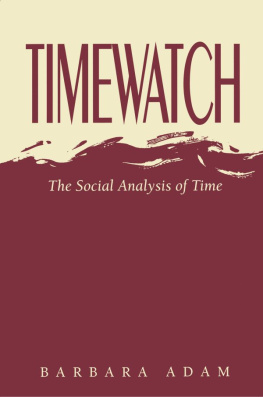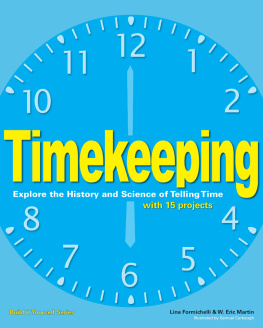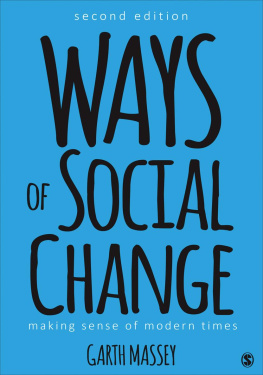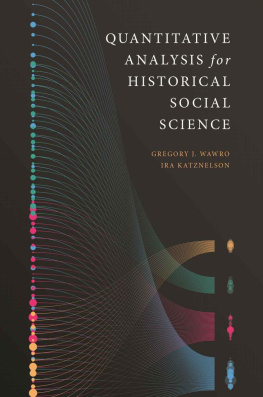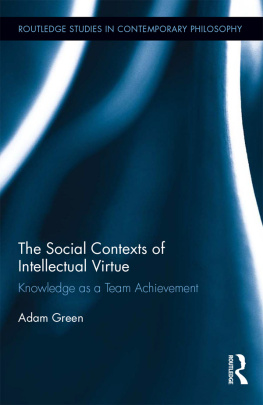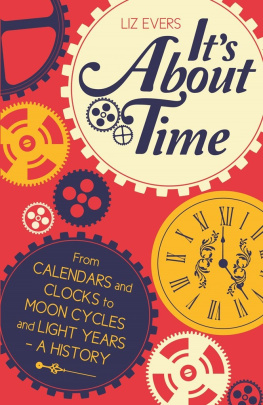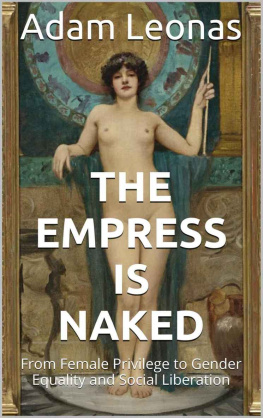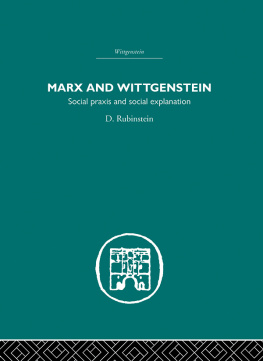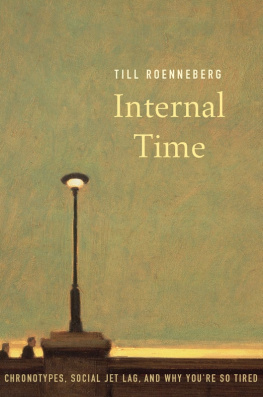To the people who have talked to me about time and specifically to Mary and Brian who have since died of cancer
Acknowledgements
Many people have contributed to the creation of this book, most notably the people who have talked to me about how time enters their lives and what time means to them. I would like to acknowledge here their invaluable contribution. I would further like to thank Stuart Allan, Jane Lones and Fiona Mackie for reading the entire script as well as Colin Hay and Alessandra Tanesini for comments on single chapters; their constructive criticisms were invaluable and very much appreciated. My special thanks, however, go to my husband and colleague Jan Adam whose critical comment and unflinching support underpin all I have written. Moreover, none of my work would be possible if he had not taken on more than his fair share of work in our labour-intensive household. Thanks also to my family as a whole for being so tolerant and to my daughter Miriam in particular not only for stepping in when I got home late on the days when it was my turn to cook or shop but also for checking my references to such a high degree of perfection.
This book has arisen from research conducted over the past eight years and consequently draws to varying degrees on the following papers: (1988) Social Versus Natural Time: A Traditional Distinction Re-examined, pp. 198226 in M. Young and T. Schuller (eds.), The Rhythms of Society, Routledge & Kegan Paul; (1989) Feminist Social Theory Needs Time. Reflections on the Relation between Feminist Thought, Social Theory and Time as an Important Parameter in Social Analysis, Sociological Review, 37: 45873; (1992a) Modern Times: The Technology Connection and its Implications for Social Theory, Time and Society, 1:17592; (1992b) Time, Health Implicated: A Conceptual Critique, pp. 15364 in R. Frankenberg (ed.), Time and Health and Medicine, Sage; (1992c) There is More to Time in Education than Calendars and Clocks, pp. 1834 in M. Morrison, (ed.), Managing Time for Education, University of Warwick; (1993a) Within and Beyond the Time Economy of Employment Relations, Social Science Information, 32: 16384; (1993b) Time and Environmental Crisis: An Exploration with Special Reference to Pollution, Innovation in Social Science Research, 6: 399413; (1994a) Perceptions of Time, pp. 50326 in T. Ingold (ed.), Companion Encyclopedia of Anthropology, Humanity, Culture and Social Life, Routledge; (1994b) Re-Vision: The Centrality of Time for an Ecological Social Science Perspective, in S. Lash, R. Grove-White, and B. Wynn (eds.), Risk, Environment and Modernity: Towards a New Ecology, Sage, in press; (1994c) Running Out of Time: Environmental Crisis and the Need for Active Engagement in T. Benton and M. Redlift (eds.), Social Theory and the Environment, Routledge, in press. I would like to thank the publishers for giving permission to use some of that material and to express my appreciation to the following colleagues, students and editors who have commented on drafts of the papers: Jan Adam, Stuart Allan, Paul Atkinson, Ted Benton, Dawn Clarke, Tia DeNora, Marco Diani, Ronald Frankenberg, J. T. Fraser, Judith Green, Tim Ingold, Tom Keenoy, Alwyn Jones, George Newell, Martin Read, Michael Redclift, Teresa Rees, Tom Schuller, Ginger Weade, Brian Wynn and Michael Young.
A passage from Penelope Livelys (1991) City of the Mind has been reproduced by Permission of Penguin Books Ltd and Harper Collins, USA.
Finally, I would like to acknowledge a few very special books that have given me intense pleasure and provided invaluable food for thought, inspiration and, above all, a context within which to think, argue and develop: (in chronological order) Pirsigs Zen and the Art of Motorcycle Maintenance; Capras The Tao of Physics; Sheldrakes A New Science of Life; Giddenss Central Problems in Social Theory; Kerns The Culture of Time and Space, 18801918; Stanley and Wises Breaking Out; Harveys The Condition of Postmodernity; Romanyshyns Technology as Symptom and Dream; Hayless Chaos Bound; Giddenss Modernity and Self-Identity; Becks The Risk Society; and Ermaths Sequel to History.
Barbara Adam
Introduction
Conversations about time
When I think about time I think that it wont be long before I am old and die. We have only so much time to live and that is not very long at all. Well, take my mum, for example, she is old now and she will die. (His mother is thirty-five, suffers from multiple sclerosis and has been tied to a wheelchair for the last five years.) When you think a lot about time it goes by that much quicker which means I grow older that much faster. On school days I just think whether it is nine oclock yet because school starts then and I must not be late. Next I think about time at three oclock when it is time to go home. My worst thing of thinking about time is on the days when I come home from school before my parents have returned from shopping or from the hospital which means that I have to go to a neighbours house. This is really an awful time because I dont know how long Ill be there and when my parents will come home.
(David, ten years old, pupil in a village primary school)
***
How time enters my life? I was born and now I am fifteen years old. We use the word when we ask what time it is. We talk about closing time, lunch-time, getting-up time, and that time is up. What time is, that is more difficult to say. It is not a person, not a thing, not a vegetable. Its a period and units, the day chopped up into hours, minutes and seconds. But it also divides the past from the future. We can see the past in pictures and writing but we cant be there that is

